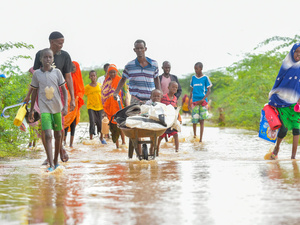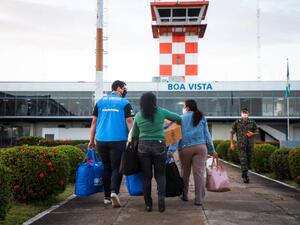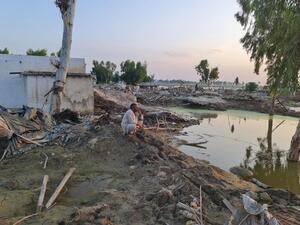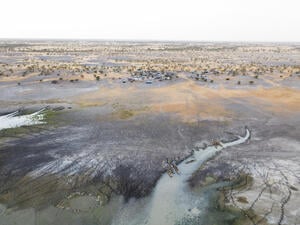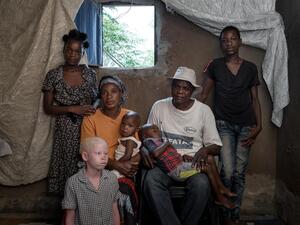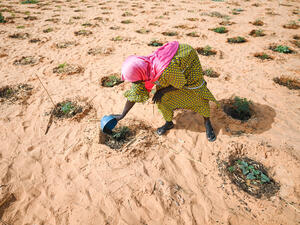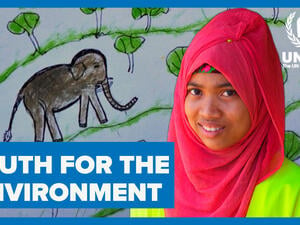Pacific islanders face the reality of climate change . . . and of relocation
Pacific islanders face the reality of climate change . . . and of relocation

Rising sea levels have caused many inhabitants in the Pacific island nation of Tuvalu to relocate, raising questions about nationality, identity and culture if the population becomes stateless.
CANBERRA, Australia, December 14 (UNHCR) - The Carteret Islands of Papua New Guinea are a three-hour boat ride from the much larger, and higher, island of Bougainville. But for the 2,500 Carteret islanders, who have lived a carefree life of fishing and small-scale agriculture, the reality of a changing climate means plans are now under way to make the trip to Bougainville a permanent one.
On the Carterets, like Tuvalu and elsewhere in the Pacific, a number of complex and interrelated factors - environmental, climatic, geological and demographic - are at play, and these are creating uncertainty about the ability of people to remain in their traditional homelands.
UNHCR Regional Representative in the Pacific Richard Towle says the protection of people affected by these factors must be part of a broader, human rights-focused response to human security and ensure social and economic development for all people in the region.
"Most of all, finding solutions to these challenges means listening, consulting, and responding to the specific needs of affected populations - whether they be coping mechanisms and adaptation or eventual relocation," Towle says.
For the Carterets, coastal erosion, destruction of sea walls and inundation by salt water means that most of the small gardens of swamp taro and vegetables upon which families depend for food are no longer fertile. Emergency food supplies are running low, and relocation increasingly looks like the only option.
After several unsuccessful attempts to move the islanders over the past few years, the authorities have identified a plantation on Bougainville as a future resettlement site and anticipate bringing families from the Carterets and other threatened atolls next year.
The Papua New Guinea government is also planning continuing services for families and individuals who remain on the atolls and is putting in place a contingency plan in anticipation of future severe climate events.
Sister Maryanne Loughry, from the Jesuit Refugee Services Australia, was on the Carterets this month to talk to residents about the relocation process. "While appreciating the assistance from Bougainville, many residents say they are worried about losing their culture and traditions and are uncertain as to how they will be received by the host community," Loughry reports.
Such dilemmas highlight the difficult choices faced by island communities under threat from rising seas, with relocation often seen as the option of last resort.
Although people displaced by climate change and environmental degradation are not classified as refugees under the 1951 Refugee Convention, UNHCR's experience has shown that they are clearly people who face great challenges and whose rights and protection needs have to be addressed.
Indeed, many communities reject the "climate refugee" label saying it gives a false sense of hopelessness, preferring to focus on adaptation and mitigation strategies to help them stay in their homes. "Many people from Pacific Island countries have told us their preference is firstly to try to mitigate the worst effects of rising sea levels such as depletion of fresh-water supplies, flooding, disease, and loss of traditional food sources, livelihoods and housing," Towle says.
On Fiji's largest island, Viti Levu, for example, an innovative coral gardening project is under way to help reduce coastal erosion and sand loss, which are considered to be major impacts of sea level rise. The project is a joint initiative of the local community, a national NGO and a holiday resort and is an example of how adaptation strategies can protect the environment and the economy.
Meanwhile, Kiribati is looking towards the development of skilled migration programmes that may be able to reduce overcrowding in the short term, while developing skills and building up communities abroad should larger-scale resettlement be required in the future.
And to help prepare for the possibility of a rise in the frequency of natural disasters, UNHCR has joined with other agencies to form a Pacific Humanitarian Protection Group to help map and analyse the protection needs of people who face risks from the elements.
These examples show the combination of approaches - disaster preparedness, mitigation and adaptation, and possible relocation - that will be needed to assist people facing climate and environmental challenges in the region. But for the Carteret Islanders, relocation appears to be the only choice left.
By Ben Farrell in Canberra, Australia

